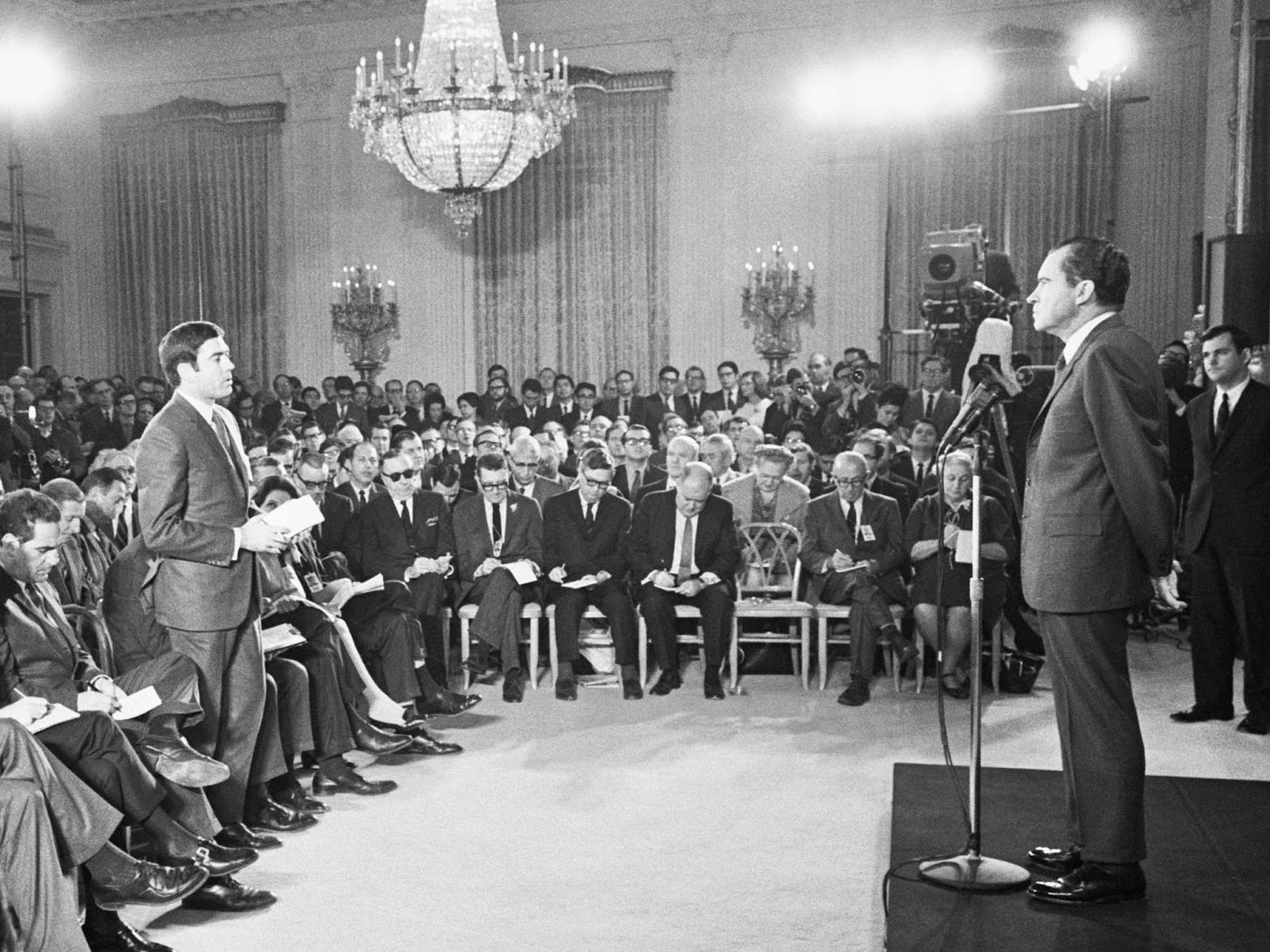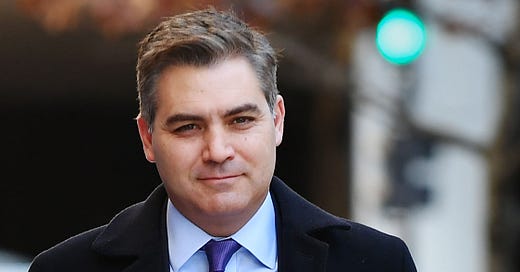
How and why is journalism failing us?
It’s something I think a lot about these days, driving through the now-blooming hills of Central Texas. The forecast calls for 90 degrees tomorrow in Austin, so before we’re forced to retreat to refrigeration until the fall, I have a thought — take a drive and roll down your windows. Now, I realize that may not be the best idea in parts of the country where winter still lingers, but if the temperature allows it, you’ll be amazed at the health effects of some fresh air.
Such a ride helps clear my head. More so than the vigorous head-shaking I do while watching or reading the news. It’s confounding and frustrating to watch political coverage these days. One Sunday talk show host on NBC News said former President Trump “allegedly” tried to overturn the 2020 election. With all due respect, please eliminate that word from any future reference to that terrible day in January 2021. There is nothing “allegedly” about it. In fairness, we all make mistakes we later regret. But still….
Then there’s the coverage, or lack of it, of Trump himself. Over the weekend, the former president said that he would eliminate federal funding for any school with a vaccine mandate. That includes vaccines against chickenpox, polio, and measles. The audience shouted its approval of this dangerous, if not outright terrifying, promise. Can you imagine the consequences of that? The children who would die? Where’s the coverage and the outrage?
Then Trump confused two Democratic presidents — not for the first time — saying, “Putin has so little respect for Obama …. ” Imagine the airtime that remark would get if it came from President Biden?
As I have said before, I believe the former president’s record demonstrates that he is a danger to the fundamental idea and ideal of the United States as a constitutional republic based on the principles of freedom and democracy. As noted here in a reminder last week, an informed and determined electorate can stop him at the ballot box.
Which brings us to the media’s role.
I have been here before — when covering President Richard Nixon and the Watergate scandal. That was a case of a widespread criminal conspiracy led by the president. Two reporters, Carl Bernstein and Bob Woodward of The Washington Post, led coverage that eventually proved that Nixon was illegally attempting to rig his reelection. This was a constitutional crisis for the nation. Woodward, Bernstein, and the Post led all the way. Nixon was indeed a crook. But there were others in the media who kept investigative heat on Nixon. Some reporters and their news organizations pulled no punches, played no favorites, and repeatedly asked tough questions of those who needed to be held accountable. Too much was at stake. And it is again now, even more so.
Forgive the personal reference, but this reporter was deeply involved in that coverage as Chief White House Correspondent for CBS News. These days, as a now completely independent newsman, I regularly remind myself of important lessons learned during that historic time. And perhaps other journalists, especially those in mainstream media, may find them worth remembering.
Enough with Both-sides-ism
We are now living in an altered political universe. Some of the old rules no longer apply or at least need adjusting. Civil discourse is a thing of the past, as is allowing both sides their say, no matter what they say, without holding them accountable. When one side lies intentionally and repeatedly, they are no longer entitled to the benefit of the doubt. They should be held to account, right away. Do not simply repeat the narratives they spew. Make no mistake: They are exploiting the idea of equal coverage to their advantage. Don’t let them get away with it.
Prioritize Live Fact-Checking
Rigorous and robust fact-checking is the best defense against misinformation, intentional lies, and deflection. Verify sources, cross-reference assertions, and provide context. If Trump says the sky is green, the story isn’t that the sky is now green; the story is that the sky is still blue and Trump got it wrong. A journalist’s commitment to ferreting out the truth builds public trust. So does adding context and perspective.
Ask Lawmakers Hard Questions
Do not let them off the hook. If they are Trump supporters, make them defend his actions and his words. Ask about the fundamental principles of democracy. Push them to go on the record that Biden won the 2020 election. Ask if they support the Supreme Court’s decision to overturn Roe v. Wade. If they are Biden supporters, make sure tough questions get asked of them as well.
Support Investigative Journalism
The Fourth Estate is essential to the existence of a healthy democracy. Daily coverage is necessary, but investigative journalism is critical to hold those in power accountable and to uncover corruption. It’s also expensive. We must recognize that its benefits outweigh its costs.
Fight Media Consolidation
For much of my 74-year career, journalism was considered a public service, not a revenue generator. At its inception, television news was rarely thought to be a big money maker. That changed in the 1980s when large corporations bought the networks. Newsrooms now had to turn a profit and were therefore beholden to advertisers. At about the same time, newspapers saw major declines in readership as the internet grew and news became “free.” Support your local paper, local TV station, and independent journalists.
Get the Story Out
This is a corollary to the previous one. As much as we as journalists wish it weren’t true, corporate ownership and advertisers do have editorial influence in newsrooms around the country. If an important story doesn’t work for your owners, consider getting it out through another journalist at another outlet or start your own.
This writing is not to offer any claim of knowing it all. Your correspondent has made his share of mistakes, but after more than seven decades I believe I have picked up a few useful guideposts. Politicians won’t like this list. Nixon certainly didn’t like me. I wear that fact as a badge of honor. On my office wall was a White House transcript of an Oval Office conversation in which President Nixon tells his FBI director, “Dan Rather is a son of a bitch. He is a smart rat. He’s clever. Have nothing to do with CBS, Rather, and that bunch. No. No CBS.” That was in 1972. Nixon would resign two years later.
Our current era is different and in some ways more difficult, but the key to survival and thriving is to never lose hope. Listening and reading about the country, you’d think hope was on life support. Good journalism helps us remember these six truths and have hope for the future.
If you support independent journalism bringing you critical information when the corporate media fails us, please consider joining as a supporting member. It allows me to keep critical pieces like this free for those who cannot afford it, in an election season where we need everyone to see it. Thank you.
No matter how you subscribe, I thank you for reading.















Hell yes down with the both sides nonsense. I’m so sick of them giving equal coverage to fascist liars who shouldn’t be given a platform ever. This is a great list of 6 things journalists absolutely need to practice. Well said.
you really hit the nail on the head when you said the media used to be a public service and not an income generator. How do we get it back to being a public service? And why are so many journalists so willing to support trump (by omission, but that comes out to support all the same) when he has made it clear the only persons who will be "ok" will be those who support him and the others will be punished, perhaps incarcerated. Are all these persons who call themselves journalists just spineless people who somehow got a job on a newspaper or local or national news show? Do they not care that they will never be able to report the truth after trump is elected and will they all be so very glad to work for fox news? They sure seem more like gossip columnists than journalists.